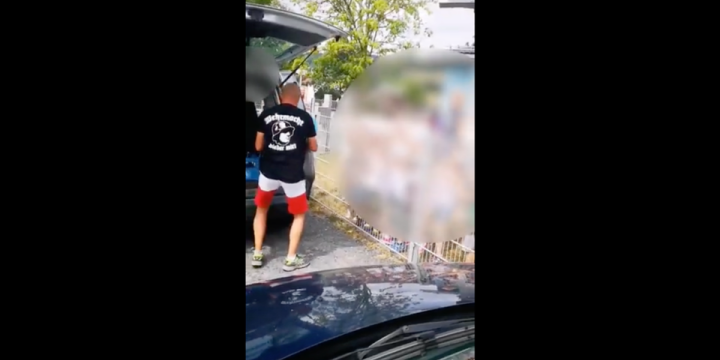Robert Stuhlmann’s win on Sunday marked the first time an Alternative for Germany candidate won a county-wide election in Germany.
By Dion J. Pierre, The Algemeiner
German police have launched a search for a suspected neo-Nazi who distributed to children balloons left over from an election night celebration held by the extremist far-right Alternative for Germany (AfD) party on Sunday in the southern region of the state of Thuringia.
Footage of the incident posted on social media shows a man dressed in black, red, and white shorts and a shirt that says, “Wehrmacht wieder mit?,” a far-right slogan meaning “Who’s going to join again?,” according to The Associated Press. Additionally, the car in which he transported the balloons said, “volunteer deportation helper,” an allusion to AfD’s anti-immigration ideology.
“The fact that a neo-Nazi apparently targets our youngest children without being asked and takes aim at kindergarten children is a serious assault,” Thuringia education minister Helmut Holter said on Tuesday in a Twitter post. “Election campaigns have no place in kindergarten. Even more so, kindergartens must be protected from anti-constitutional messages.”
Robert Stuhlmann’s win on Sunday marked the first time an AfD candidate won a county-wide election in Germany and has caused worry about the allure of far right extremism among the country’s electorate.
Several AfD leaders have attempted to play down or whitewash the systemic brutality of Germany’s 12-year period under Nazi rule. In 2017, one the AfD’s most outspoken regional leaders, Björn Höcke, sparked outrage when he declared himself disgusted by Berlin’s memorial to the Nazi Holocaust. “We Germans are the only people in the world to have planted a monument of shame in the heart of their capital,” Höcke said. Similar sentiments were also expressed by Alexander Gauland, the leader of the AfD’s parliamentary faction, who dismissed the Nazi era as a “speck of bird poop” on Germany’s “glorious history” in a speech in 2018.
When a neo-Nazi murdered two people outside a synagogue in the German city of Halle in 2019, several party officials described it as a “false flag” operation. One MP, Stephan Brandner, accused lawmakers who attended a vigil commemorating victims of antisemitism of “lounging in front of synagogues.”
Voters for AfD have been increasing steadily since it formed in 2013. In a 2019 state election in Thuringia, it knocked the Christian Democratic Union into third place and finished second in two other regional elections in Brandenburg and Saxony. It has, however, lost seats in the Bundestag. In 2019, it had 91 seats in the body. Today, according to the German government, it has 78.





